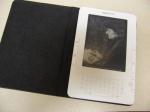A new weblog, familiar challenges
The desire to write, to think out loud, to write down a thought and launch it into the ether is a little like creating that golden disk containing voice and music recordings, bolting it to the fender of Voyager II, and hoping that some intelligent being somewhere in the far reaches of the Milky Way galaxy or beyond will come across it and pick up the thread. Okay, writing a blog post is not very much like the $865 million effort required to launch Voyager and its message disk to interstellar space. Yet you have to admit that both actions require a healthy dose of optimism.
Hello, from the children of planet Earth.
A group of us are working on a blog design that we hope will invite faculty, students, staff and alumni around the world to stop by, read, and respond. We hope that they will contribute their thoughts, comment and join in the conversation.
This is a challenge. Design is a very personal, even intimate process. What one considers artful, another considers esoteric. The elegance of one format is an obstacle to the urge for spontaneity in another. Form either follows function or defeats it depending on your individual goals, which rarely come into focus until we see something and experience our reaction to it. Fact is, until this moment in the collaborative act of creation, none of us have come to terms with our desires, wants and needs for this blog. Which is one of the benefits of process. Show me a creator of anything who gets it right the first time and I’ll show you a creator who aimed low.
When we previewed the blog design-in-progress for a group of smart and entrepreneurial students, it was met with clear interest, encouragement of its strengths, and helpful inquiries about ways to address its underlying potential for engaging the real-life needs of students, faculty, alumni and prospective students and their families.
Interactivity – can it be organized into at-a-glance categories? No one wants to scroll through a long page of disparate posts and comments to find something of interest. We’re all busy. Give us the top-ranking or most popular threads in politics, student life, music, news, and so forth.
In other words, edit content and format presentation. Yes, this involves some processing of content in what was originally envisioned as an open, transparent, and unmoderated online dialog. They acknowledged this. They know their peers. There will be the occasional ‘immature’ post, but that is life and it can be managed. More than anything, they were optimistic that the worldwide community of students, faculty and alumni would ultimately self-moderate. I also believe that they will. Recent research suggests that they have it right.








